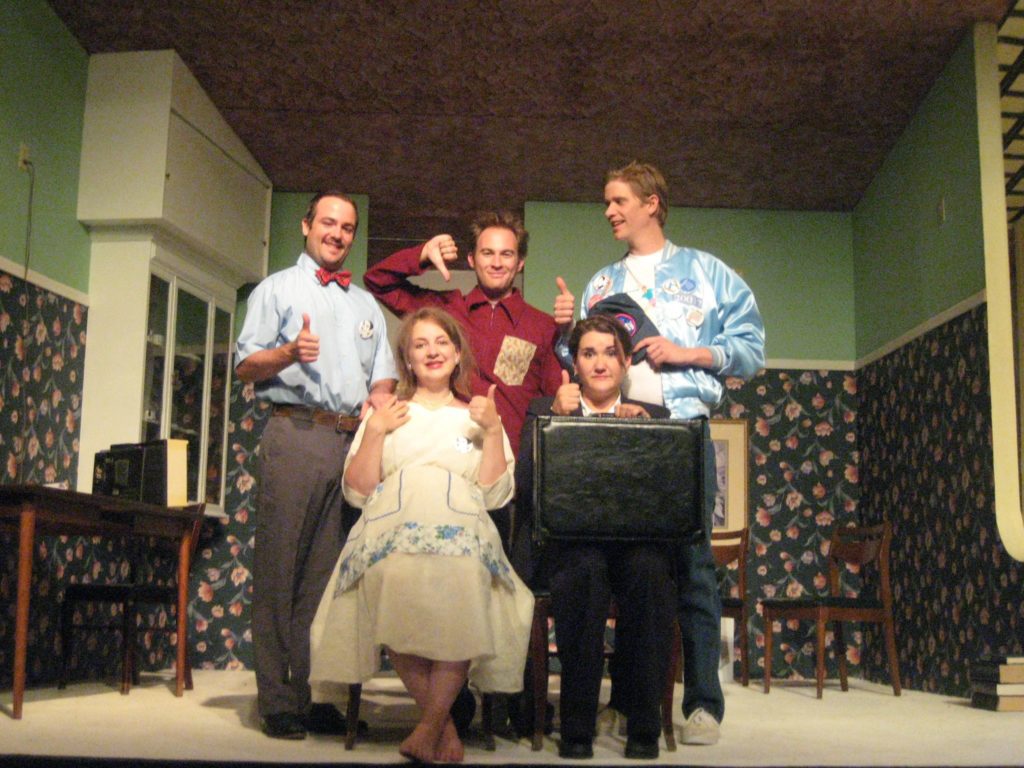From the moment you walk into the theater and see the topsy-turvy set, the central metaphor of Vote for Uncle Marty is obvious. And although the suggestion that we live in an upside-down world isn’t particularly original, the play certainly is, since it arises from the collaborative work of Buntport’s five actor-director-playwrights – Brian Colonna, Erik Edborg, Hannah Duggan, Evan Weissman and Erin Rollman – as well as the sixth, non-performing member, SamAnTha Schmitz.
What else are these characters doing? Well, Colby, very pregnant, is watching Spanish soaps on television, trying to figure out the action though she doesn’t understand the language. Her husband, J.J., has a jigsaw puzzle on the table and is attempting to solve it on a theoretical level without actually manipulating the pieces. Several years ago, Colby’s sister Heather befriended the affable, empty-headed Marty because she believed he would make a good city councilman; she’s been planning his campaign ever since, worrying more about the color of his posters and the need for a slogan than about his complete lack of anything resembling a platform. There’s also Colby’s Uncle Gene – her mother’s brother, and not much older than she is. Gene is the only character who seems troubled by the house’s topsy-turviness. He places himself in various upside-down positions, hangs a mirror above his own nose so that he sees a right-side-up reflection, and rails at the others for their lack of interest in the problem. The final member of this household is Colby’s mother, who remains upstairs and invisible throughout.The company usually makes an art of scene-changing and object manipulation, but this set is remarkably stable and solid. It shows a tightly constructed house interior, with carpet on the ceiling and weirdly vertiginous stairs (to go downstairs, you ascend). The arch of a doorway curves from the floor like a C set on its back. The wallpaper’s floral pattern is upside down as well. The furniture is all right side up, and the inhabitants of the house have set up various objects to serve as steps where needed – a pile of books here, a toaster there. Eventually, two of the characters will get into a heated dispute over a painting of flowers that looks fine no matter how it’s hung.
These activities – Colby’s withdrawal into fantasy, Marty’s ineptitude, Heather’s meaningless political busywork, J.J.’s devotion to abstraction, the patently absurd manipulations of Uncle Gene – are all intended to represent the American public’s response to the current political situation; that much is clear. Even the complete inactivity of the absent mother figure is meant as a protest. (During the Vietnam era, John Lennon said that he and Yoko Ono intended to stay in bed until the war was over. As explained by Uncle Gene, the mother’s gesture is just as dopey, but a good bit more entertaining.)
As I watched, I couldn’t help but think about Ionesco’s 1959 play Rhinoceros, in which one person after another metamorphoses into a thick-skinned, lumbering, snorting beast. Everyone in Ionesco’s original audience would have understood that this was a warning both of the dangers of fascism and of the kind of mindset that allowed fascism to prevail. But in this interesting, evocative piece, the Buntporters never tell us why they feel our world is upside down. Perhaps they assume that in a time of endless war, secret imprisonment and torture, not to mention government propaganda unquestioningly parroted by the mass media, the answer is apparent. Still, while no one wants to sit through a political polemic, I’d have liked more of a clue.
Uncle Marty is far more than political satire, however. There are other currents at work here, and lots of wit in the writing. And the characters are truly fascinating: Edborg’s hapless, good-natured, oddly soulful Uncle Marty; Colonna’s squeaky, jerky J.J.; Duggan’s campaign manager, who keeps storming off the job only to return again, and who hides a pathetic insecurity beneath her businesslike saleswoman’s exterior. There may still be a few folks around who haven’t figured out that Rollman is one of Denver’s most accomplished and original actresses; if so, her performance here should clear the wool from their eyes. Colby is more hugely and monstrously pregnant than any woman has ever been before; her great swollen mound of a belly seems to control her every action, while she peers around it like a toddler carrying a beach ball. Despite her increasingly dark-ringed eyes and ever-lanker hair, Colby is trying to be sweetly maternal, but flashes of demented rage keep piercing her mellifluous exterior. Weissman hurls himself both physically and mentally into the role of Uncle Gene, and even though he’s ridiculously funny, you can feel the real desperation at his core.
The Buntporters have worked together for several years now in a way that few other theater artists can match. They know each other’s tics and rhythms, passions and ideas, and the resulting inventions are wonderfully wry and entertaining. Although I still think the time has come for someone, somewhere, to revive Rhinoceros.
-Juliet Wittman, September 13th, 2007, Westword
